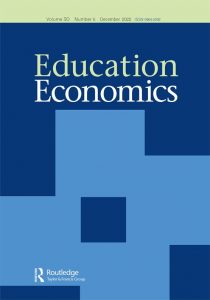Intergenerational educational mobility
– The role of non-cognitive skills
ABSTRACT
While it has been shown that university attendance is strongly predicted by parental education, we know very little about why some potential first-generation students make it to university and others do not. This paper looks at the role of non-cognitive skills in the university participation of this disadvantaged group in England.  We find that having higher levels of locus of control, academic self-concept, work ethic, and self-esteem in adolescence is positively related to intergenerational educational mobility to university. Our results indicate these skills help potential first-generation students to compensate for their relative disadvantage, and they are especially crucial for boys.
We find that having higher levels of locus of control, academic self-concept, work ethic, and self-esteem in adolescence is positively related to intergenerational educational mobility to university. Our results indicate these skills help potential first-generation students to compensate for their relative disadvantage, and they are especially crucial for boys.
KEYWORDS: Socioeconomic gaps, intergenerational educational mobility, higher education, non-cognitive skills
JEL CODES: I24, J24



